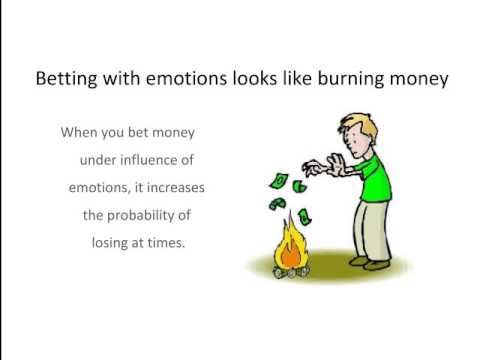7 Differences Between Casual Betting And Professional Betting

Have you ever been tempted to make online sports betting your full-time career? Ever wanted to leave behind the stresses and pressures of your job, and earn a good living as a professional bettor?
A lot of folks do it. And many of them generate a great income in the process.
However, making a living betting on sports isn’t easy. And it’s not without stress. Far from it. The pressures of being right often enough to make ends meet has driven more than a few aspiring pros back to their 9-to-5 jobs.
But if you can handle the stress, make smart decisions, and possess enough capital to weather the inevitable cold streaks, you may be a good candidate for this rewarding career path. Having said that, it’s important to know what it takes to make the cut. Following are seven things professional sports bettors do that separate them from casual bettors.
Pro Sports Bettors Shop Lines
- team strength
- weather forecast (for football)
- player injuries
- home field advantage
- matchups
- coaching decisions
- and more
Pro Sports Bettors Do The Math
Pro Sports Bettors Track Everything
- date
- day of week
- sportsbook
- sport
- event (e.g. Week 1 vs. Super Bowl)
- type of bet
- odds
- spread
- over/under
- stake
- result (win vs. loss)
- payout (or amount lost)
- running profit/loss total
Pro Sports Bettors Recognize The Value Of “Value”
Pro Sports Bettors Do Pre-Event Analysis
Pro Sports Bettors Plan For Losses
Pro Sports Bettors Set Goals
- you typically win 50% of your bets
- your average stake is $100
- your average payout is $250 ($150 profit)
Sportsbooks use different “recipes” to set lines on points-based sports. They take into account most of the same criteria, but assign varying weights to each factor.
For example, Bovada, BetOnline, and Intertops all use the following “ingredients” to set lines:
But each factor receives a different weight according to how oddsmakers perceive its importance. The end result is that lines often differ from sportsbook to sportsbook.
Professional bettors recognize the value of shopping lines. They know it can mean the difference between a profitable wager and a losing one. So they register accounts at all of the top online sportsbooks: Bovada, BetOnline, Intertops, SportsBetting, MyBookie, etc. When they’re ready to bet on a particular game, they compare lines across the board.
That’s how they get the most mileage out of their bankroll.
It’s difficult to win consistently unless you learn how to properly handicap games. And it’s difficult to handicap games unless you do the math.
The good news is that sports betting math is relatively simple once you get used to it. It may seem like a foreign language at first, but it gets easier with practice. Moreover, if you go pro, you’ll be using spreadsheets and formulas that’ll do the heavy lifting for you.
Let’s take a look at a hypothetical football game between the Patriots and Chargers. Here’s how the numbers might appear at your favorite sportsbook:
Chargers +7 1/2 (-110) +280 49 (-105)o
Patriots -7 1/2 (-110) +360 49 (-115)u
the +/- 7 1/2 is the point spread
the -110 are the odds on the spread
the +280/+360 is the moneyline
the 49 is the total (over/under)
the -105/-115 are the odds on the total
The numbers reflect three different types of bets (spread betting, the moneyline, and the over/under). As a professional sports gambler, you need to know how to work with them, and possess the willingness to do so before making each wager.
In the future, I’ll take you, step by step, through an example. For now, suffice to say that pros do the math.

Casual bettors rarely keep meticulous records. Betting is a hobby for them. A leisure activity. It’s a way for them to blow off steam and have some fun in the process. They come home from work, log in, and place a few bets, hoping to get lucky.
It’s understandable that record-keeping isn’t a top priority for them.
By contrast, professional sports bettors are like quasi-accountants. They track everything.
Why? Two reasons.
First, they hope to identify trends they can leverage into an advantage. Second, they know their future success is influenced by their ability to learn from their mistakes.
It’s tough to learn from your past performance if you neglect to track it. Or, as management guru Peter Drucker once said,”What gets measured gets managed.”
What do pro bettors track? Here’s a sampling for a given wager:
You can use a spreadsheet to monitor these details. Or use an app designed for sports bettors, such as Onside Sports. You can also go low-tech, and use a pen a paper.
The tools are irrelevant. The important thing is that you track these details. Over time, you’ll build a nice database of results that’ll help you uncover opportunities.
That’s what the pros do.
“Value” is a oft-misunderstood term in the context of sports betting. At its simplest, it means getting the most bang for your bankroll. If we extend that definition, it means gauging a team’s chances of winning, and evaluating the resulting payout according to the listed odds.
Sometimes, betting the underdog is a better value. The probability of a win may be lower than the probability of a loss, but the odds and the associated payout make the wager sensible.
Professional sports bettors are always looking for value. They recognize that value betting is the surest path toward long-term profits. This understanding encourages them to be contrarians when oddsmakers adjust lines to compensate for a deluge of public money.
In other words, the sharp money zigs when the public money zags.
Consider how a casual bettor might approach a game between the Patriots and Chargers. He might think to himself, “Tom Brady’s playing tonight. Plus, the team looks good at wide receiver. They’ll probably cover the spread.”
And he’ll go on to place a bet on the Patriots.
The pros go deeper. Much deeper. Before the event, they run the numbers and calculate their own spread (or where they believe the line should be). This is usually done with the help of spreadsheets and formulas, or software.
Once the pros work out their expected spread (or moneyline), they compare it to the one offered by the sportsbook. If they perceive an error in the book’s spread or line, they jump in, hoping to take advantage of it before adjustments are made.
Does this involve a lot of work? Yes. But it’s also one of the reasons professional bettors’ results consistently beat casual bettors’ results.

If you do this for a living, you’re going to rack up a fair amount of losses. And some of those losses might be expensive. That’s the nature of the beast.
Casual bettors are often taken aback when they lose wagers. And the larger their losses, the greater the hit to their confidence.
Sometimes, they’ll chase their losses. This is a terrible idea because their confidence is shaken, they’re annoyed and impatient, and perhaps even desperate. That’s a bad place from which to make bets.
Other times, their losses cause them to doubt themselves. They become gun shy. These bettors don’t chase their losses. On the contrary, they become paralyzed with fear and indecision.
So what do professional sports bettors do differently in this regard? They have a bankroll management plan. This plan all but eliminates the emotions associated with losing bets.
Of course, no one enjoys losing bets. The difference is that the pros plan for it. They realize that being a full-time sports gambler means they’re going to lose a lot of the time. But they don’t get emotional about it. In fact, individual losses rarely concern them. Instead, they review each lost wager with an analytical eye, looking for errors in their pre-game evaluation.
Full-time sports gamblers set a variety of goals. Then, they work backwards, creating a plan that’ll help them to achieve those goals.
For example, they’ll decide how much profit they want to earn each month. Once they have this figure in mind, they’ll determine how many bets they need to make each day, and how much to stake.
This type of planning requires the pro bettor to know how he has performed in the past. He needs to be aware of the percentage of bets he wins during a typical month. He also needs to take into account his average stake and average payout. From these numbers, he can come up with a daily plan that’ll allow him to hit his monthly profit goal.
For example, let’s say you want to make $12,000 a month in profit (before taxes). That’s $400 a day, seven days a week. Let’s also suppose the following:
Given these numbers, you would need to make 16 bets per day. You can expect to lose eight (50%), but make $150 profit on each of the eight bets you win. (These numbers may seem unrealistic, but they keep the math simple.)
Professional sports bettors increase their goals each year. For example, if they made $200,000 last year, they set a goal to make $250,000 this year. It pays to be ambitious because this target drives their daily plan.
It keeps their noses to the grindstone, and prevents them from getting lazy and lethargic.
Do You Have What It Takes To Be A Professional Bettor?

When you’re a casual bettor, the grass looks greener on the other side.
You dream of being able to quit your job and do this for a living from the comfort of your home.
You may indeed be able to do exactly that. But it’s important to gauge your skills with an unbiased eye, and then weigh the pros and cons of becoming a full-time sports bettor.
There are appealing benefits to doing this full time. For example, you can make your own schedule. After all, you’re the boss. You can do the work from anywhere – your living room, at Starbucks, or while lounging at the beach. And perhaps the biggest appeal is that there’s no ceiling on your income.
Of course, there are also downsides. For example, it’s a solitary, isolating business. You won’t have anyone to shoot the breeze with, as you might in an office setting. (Pets don’t count.)
Also, there’s no guaranteed paycheck. You may do very well this year, making several times your normal salary. Or you might get pummeled. There’s no certainty when it comes to your income.
Another potential drawback is that you need a relatively large bankroll to start. Remember, you’re going to lose a large percentage of bets. You need a bankroll that’ll help you weather the losses.
Do you have what it takes to do this full time? It’s a risky proposition. But if you have a passion for sports betting, are willing to do the work, and are adept at making smart decisions, there are worse ways to make a great living.
I recommend you start your new career by registering accounts at the following acclaimed sportsbooks:
Also on your way to becoming a pro, make sure not to make these mistakes.
More Great Articles:


